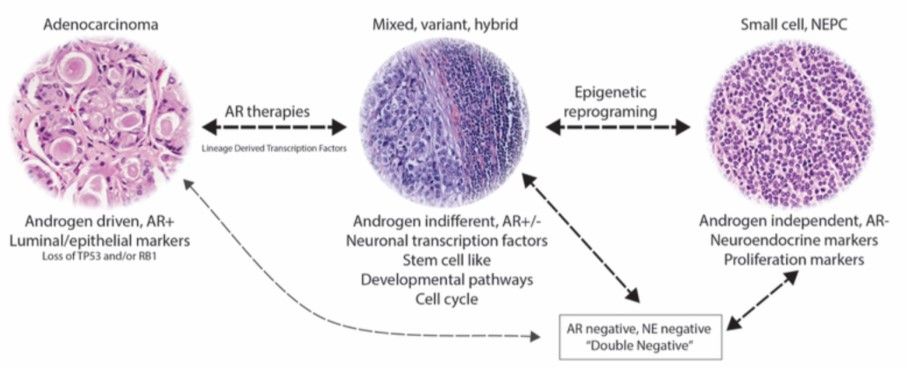David S. Rickman, Associate Professor of Pathology and Laboratory Medicine
Summary
- Prostate cancer (PCa) is the second leading cause of cancer death in American men after lung cancer
- Although there are several treatments for PCa, in many cases, treatment fails, and tumors continue to progress
- Dr. Rickman and a team of leading investigators in the PCa space are pioneering a deep target mining effort to identify novel immunotherapy targets for neuroendocrine prostate cancer (NEPC)
Technical Overview
- PCa patients who don’t respond to 1st or 2nd line therapies go on to develop NEPC, which has a mean survival of 12 months
- Lineage plasticity has emerged as an important mechanism of treatment resistance in prostate cancer
- In order to better understand lineage plasticity, development of treatment resistance, and uncover novel therapies for NEPC, Dr. Rickman and colleagues are using use patient-derived organoids and genetically engineered mouse organoids in order to characterize surface proteins that are specific to the NEPC phenotype
- Candidate surface proteins will be validated using immunohistochemistry on an established biobank of tissue samples
- Lead candidates will be evaluated for efficacy using both in vivo and in vitro models
- The team has access clinical samples and are confident that they will identify key surface proteins that are unique to NEPC and can be targeted for therapeutic drug intervention
Market Opportunity
- Prostate cancer for the most part is very treatable. However, androgen resistance leading to NEPC can dramatically reduce treatment options and has very poor prognosis
- NEPC impacts roughly 35/10,000 people a year
- Dr. Rickman and colleagues have developed a deep target mining platform that will enable a complete understanding of the NEPC surfaceome and factors that drive the development of NEPC
- The platform can also be expanded to mine for additional PCa druggable targets which will drastically reduce mortality
Partnering Opportunity
Weill Cornell Medicine is seeking an industrial partner with deep domain expertise and a presence in the oncology space to advance the development of this novel strategy and its unique enabling resources and technologies
Supporting Data / Figures

Figure 1: Working model of lineage plasticity in prostate cancer.
Contact Information

For additional information please contact
James Bellush
Manager, Scientific Scouting
Phone: (646) 825-3681
Email: james.bellush@cornell.edu

